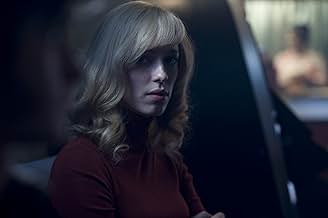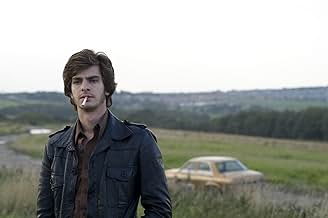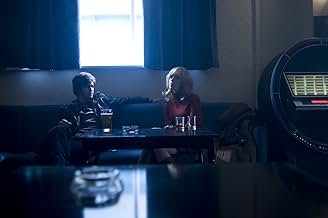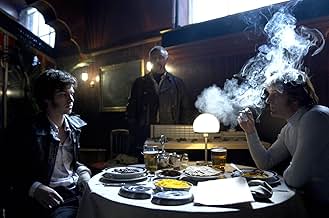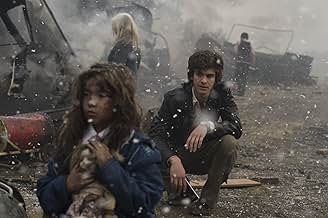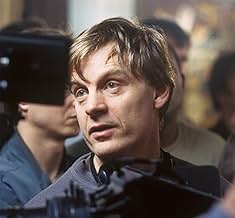The Red Riding Trilogy: 1974
- TV Movie
- 2009
- Tous publics avec avertissement
- 1h 42m
Rookie journalist Eddie Dunford is determined to find the truth in an increasingly complex maze of lies and deceit surrounding the police investigation into a series of child abductions.Rookie journalist Eddie Dunford is determined to find the truth in an increasingly complex maze of lies and deceit surrounding the police investigation into a series of child abductions.Rookie journalist Eddie Dunford is determined to find the truth in an increasingly complex maze of lies and deceit surrounding the police investigation into a series of child abductions.
- Won 3 BAFTA Awards
- 5 wins & 10 nominations total
- Steph
- (as Katharine Vasey)
- Director
- Writers
- All cast & crew
- Production, box office & more at IMDbPro
Featured reviews
He's been in the South, you see. American viewers with a limited perception of the UK may, at the beginning of Channel Four's remarkable Red Riding trilogy, have little understanding of what difference that makes. They will soon learn. "This is the North," says one of the terrifying policemen who populate this film's haunted Yorkshire. "Where we do what we want."
Red Riding: In the Year of Our Lord 1974 begins under lowering skies. A girl of ten has vanished. A young and callow crime reporter Eddie Dunford (Andrew Garfield) gets clued in by a conspiracy-minded colleague that the vanishing resembles two previous cases within a close range. Eager to make his mark, he senses opportunity, and in excitement at the idea that a serial murderer might be at work he blurts, "Let's keep our fingers crossed."
As the story deepens, however, so does the character. The grief of the victims' families needles him; he begins a relationship with one girl's heartsick mother (Rebecca Hall). Picking apart the story that emerges, he is drawn into the orbit of a wealthy developer (Sean Bean) with an unwholesome degree of influence in Yorkshire and its power structure. The perpetrator of the crimes is unquestionably psychopathic -- he stitches "angels' wings" into his victims' backs. Yet, in the film's most disturbing element, the police department itself functions as a psychopath, achieving its desires through brutalization, torture, and even possibly murder.
Caught in a conscienceless land, Dunford's own conscience, in reaction, grows, and what began as mere ambition transforms into a perhaps doomed lust for the truth. If this sounds like a conventional trope of the genre, it is -- plotwise much of what happens here is conventional. But Red Riding makes the narrative fresh by treating it not just as a story of crime and justice but as one of the soul, and its environs. When Dunford begs the mother to escape with him from the prevailing madness, he tells her, "In the South the sun shines." What he's telling her is that the sickness is inseparable from the place. Yorkshire is filmed (with gorgeous gloom) as a cloud-shrouded ruin, an economic disaster site in which financial power trumps morality. Starting out fresh-faced, vain, and cocky, Dunford will, by the end of his journey, be considerably the worse for wear. Looking at the landscape around him, we think, how could he not be?
Red Riding 1974 is not flawless -- some scenes feel repetitive and the bleakness can be overwhelming. But it compels you forward, it stays with you, and it genuinely rattles the spirit. This is not easy viewing, but in approaching the continuing saga, it promises hard- earned reward.
What begin with an investigation into a young girls disappearance, gives way to a murder, then to police corruption and bureaucratic cover-ups. Dropped squarely in the center is amateur journalist Eddie Dunford (Andre Garfield) whose combination of determination and coyness take him down a dark road. I will not even delve into the plot more than I have, as not only is it too complex to adequately lay out, but I am still trying to sort it all out myself.
While the performances are uniformly good, the characters are thoroughly unlikeable. Even our protagonist Eddie has a smarmy quality to him that makes it difficult for a real connection to be achieved. This is so with much of Red Riding: 1974, we are kept at arms length; never able to engage with any of the players nor the grief and depression the town is experiencing. Such is amplified further by the engrained ugliness at every corner which inhibits any discernible depth; everyone has demons, everything is wrong and nobody is happy. Thus, the instances of violence are muted by the grimness by which it is surrounded.
If you are really hankering for a dark tragic crime film starring Andrew Garfield, check out Boy-A; a supremely better and more resonant film. The highlight of the film for me was seeing Sean Bean again. His presence in films is an iota of what it should be and he gives one of the films best performances. Not having yet seen the following two instalments of this series I can not say with confidence this film will not be elevated when viewed in context. At this point, what I can say with confidence is Red Riding: 1974 was not an enjoyable experience. Perhaps, then, it was a success in its own right.
Read all my reviews simonsaysmovies.blogspot.com
In 1974, the bright-young-thing Eddie Dunford (Garfield) is an ambitious crime reporter for The Yorkshire Post, who takes it on himself to probe three similar cases of missing or murdered teenage girls, which puts his own life on the line. He hits every nook and cranny of procedural clichés, from losing a dear colleague Barry Gannon (Flanagan). who knows too much of the dirty business (after being inauspiciously warned about his own safety) nevertheless withholds crucial information from Eddie, to the police's porous covering-up of the culprit with a scapegoat Michael Myshkin (Mays), until Eddie meets Paul Garland (Hall), who channels a shopworn ambiguity between a grieved damsel-in-distress and an inscrutable gangster's moll, whom he incurably falls in love with. Finally his path comes across with John Dawson (Bean), a local real estate magnate, and after succumbs to an excruciating reality check signed by both Dawson and police force, Eddie despondently realizes he cannot save nobody, a final vigilante bloodbath is his last gamble to right the wrong in the only option he is left with (again, manipulated). The movie is shot in subdued retro-sheen, Garfield fleshes out Eddie's fix with absorbing commitment, and Hall is magnificent to behold in her blond charisma.
Eddie Dunford (Andrew Garfield) is a persistent yet very naive journalist trying to solve the case behind the disappearance of some girls from the surroundings. The more he goes with the story he'll find more and more trouble, to the point of having a strange tendency of getting punched by corrupt cops who don't want him near of the people who might know what's the truth behind the deaths. Haven't we seen that before?
The film wasn't strong enough to make me feel deeply interested at certain parts (the course of Eddie's investigations are quite boring, so in order to lift things higher the director gives us lots of sex scenes, a little bit pointless but interesting to see, specially because Garfield is in all of that). It's very well made, well acted specially by Garfield and Sean Bean, who plays a powerful businessman. The historical reconstruction, art direction and costumes (the corny pants Andrew wears are priceless) are really good. But I'm a little saturated of plots like that, very surpriseless and very obvious.
So, I made my point of what works in this piece. If you think you should see it go forward. It's up to you. Totally recommendable for fans of Garfield, Bean, Eddie Marsan, Peter Mullan, David Morrissey and others. 6/10
'Nineteen Seventy-Four' has shades of 'Taxi Driver', the narrative framed not by the steam that rises from the streets of New York City but instead by the skies of Yorkshire. The comparison between the two movies really occurred to me most strongly at the end of the film and I think you'll see why.
The acting is spot on from everybody. I can't think of one performance that stands out for the wrong reasons. Andrew Garfield is excellent in the lead role and Sean Bean is on form.
The exploration of police corruption and the struggle for both revenge and justice resonate well beyond the ending of the film.
The cinematography is excellent and it is disappointing that films of this quality have to be shown on television because they won't find enough of an audience in the majority of British cinemas.
Did you know
- TriviaThe television trailers for all three Red Riding episodes bore the tagline "Based on True Events." Nevertheless, none of the characters, nor the murder victims, bear the names of real people and only a few have obvious real-life models.
- GoofsSean Bean's Jensen is plated 'P.' This denotes 1975 and 1976, not 1974, as new plates were issued every August. Andrew Garfield's Vauxhall Viva, registered in August 1974 with 'M' plates, would therefore have been brand new.
- Quotes
[first lines]
Eddie Dunford: Little girl goes missing, the pack salivates. If it bleeds it leads, right? Eddie Dunford, crime correspondent, back home to take the north. Business first. Dad won't mind waiting.
- ConnectionsFeatured in The Big Fat Quiz of the Year (2010)
Details
- Release date
- Country of origin
- Official site
- Language
- Also known as
- Red Riding: The Year of Our Lord 1974
- Filming locations
- Ferrybridge, Kirkhaw Lane, Knottingley, Wakefield, West Yorkshire, England, UK(Ferrybridge Power Station)
- Production companies
- See more company credits at IMDbPro
Box office
- Budget
- $9,000,000 (estimated)
- Gross US & Canada
- $151,644
- Opening weekend US & Canada
- $14,526
- Feb 7, 2010
- Gross worldwide
- $151,644
- Runtime
- 1h 42m(102 min)
- Color
- Sound mix
- Aspect ratio
- 1.85 : 1







